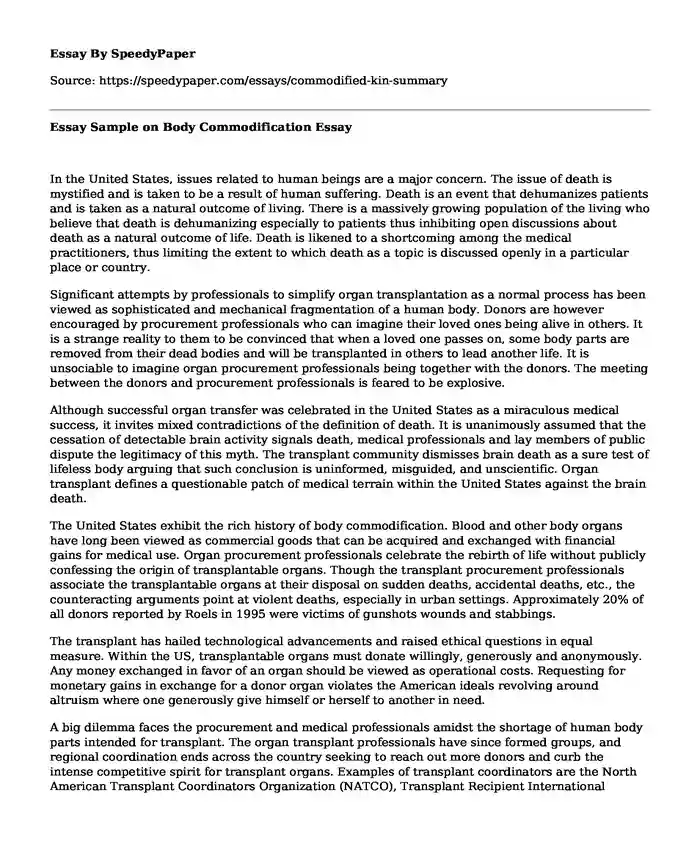In the United States, issues related to human beings are a major concern. The issue of death is mystified and is taken to be a result of human suffering. Death is an event that dehumanizes patients and is taken as a natural outcome of living. There is a massively growing population of the living who believe that death is dehumanizing especially to patients thus inhibiting open discussions about death as a natural outcome of life. Death is likened to a shortcoming among the medical practitioners, thus limiting the extent to which death as a topic is discussed openly in a particular place or country.
Significant attempts by professionals to simplify organ transplantation as a normal process has been viewed as sophisticated and mechanical fragmentation of a human body. Donors are however encouraged by procurement professionals who can imagine their loved ones being alive in others. It is a strange reality to them to be convinced that when a loved one passes on, some body parts are removed from their dead bodies and will be transplanted in others to lead another life. It is unsociable to imagine organ procurement professionals being together with the donors. The meeting between the donors and procurement professionals is feared to be explosive.
Although successful organ transfer was celebrated in the United States as a miraculous medical success, it invites mixed contradictions of the definition of death. It is unanimously assumed that the cessation of detectable brain activity signals death, medical professionals and lay members of public dispute the legitimacy of this myth. The transplant community dismisses brain death as a sure test of lifeless body arguing that such conclusion is uninformed, misguided, and unscientific. Organ transplant defines a questionable patch of medical terrain within the United States against the brain death.
The United States exhibit the rich history of body commodification. Blood and other body organs have long been viewed as commercial goods that can be acquired and exchanged with financial gains for medical use. Organ procurement professionals celebrate the rebirth of life without publicly confessing the origin of transplantable organs. Though the transplant procurement professionals associate the transplantable organs at their disposal on sudden deaths, accidental deaths, etc., the counteracting arguments point at violent deaths, especially in urban settings. Approximately 20% of all donors reported by Roels in 1995 were victims of gunshots wounds and stabbings.
The transplant has hailed technological advancements and raised ethical questions in equal measure. Within the US, transplantable organs must donate willingly, generously and anonymously. Any money exchanged in favor of an organ should be viewed as operational costs. Requesting for monetary gains in exchange for a donor organ violates the American ideals revolving around altruism where one generously give himself or herself to another in need.
A big dilemma faces the procurement and medical professionals amidst the shortage of human body parts intended for transplant. The organ transplant professionals have since formed groups, and regional coordination ends across the country seeking to reach out more donors and curb the intense competitive spirit for transplant organs. Examples of transplant coordinators are the North American Transplant Coordinators Organization (NATCO), Transplant Recipient International Organization (TRIO), and Indiana Organ Transplant Organization (IOPO). Donors have even gone a notch higher to seek a monthly donor quota.
Transplant procurement professionals have difficulties at their work. Although they specialize in death, they do not go public and identify themselves. In my face, my argument is that body organ transplant should be enhanced especially when donors are in the intensive care unit.
Cite this page
Essay Sample on Body Commodification. (2022, Mar 24). Retrieved from https://speedypaper.com/essays/commodified-kin-summary
Request Removal
If you are the original author of this essay and no longer wish to have it published on the SpeedyPaper website, please click below to request its removal:
- Free Essay on Medical Savings Accounts
- Free Botanists Essay Example
- Problem Statement about Equity in Education
- Essay Sample on Article Summary: Commercial Evictions and Landlord Liens by Heather Bridgers
- Essay Example on Implementation of Activity Based Costing
- Free Essay Sample on Causes of Modern Slavery
- Essay Sample on Open Government Implementation
Popular categories





